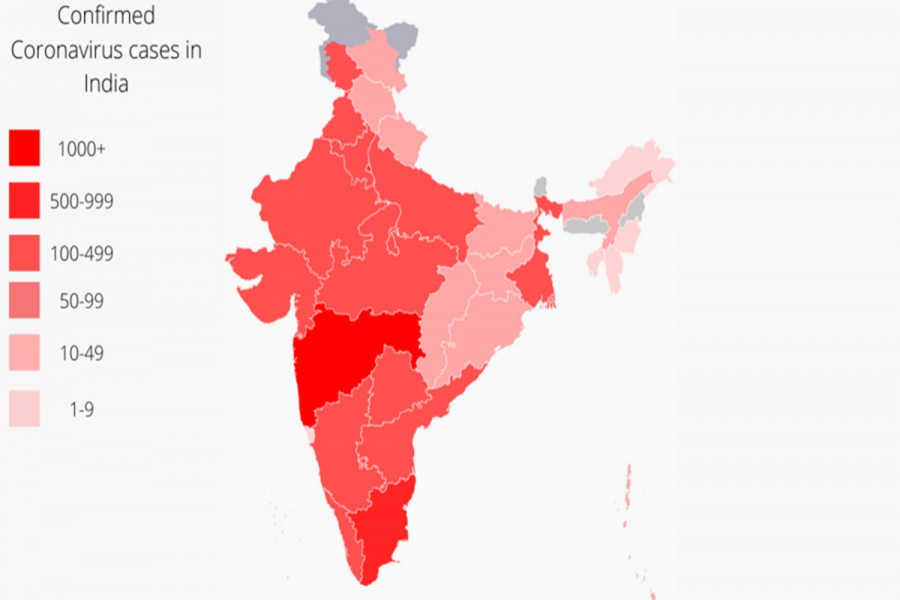Smaller countries, greater damage
Coronavirus has immense impact on less-wealthy countries
This map shows the number of confirmed cases of the Coronavirus throughout various states in India. An extremely high poverty rate and lack of drinkable water, coupled with a healthcare system is underfunded, are the main reasons for their inability to have handled a crisis like COVID-19.
In the United States, the coronavirus has impacted virtually every aspect of life. In places like New York, its spread has become unmanageable for hospitals, and the count of people falling ill has risen exponentially. But in countries without the wealth and development that the U.S. possesses, its devastation is even greater.
Almost every person within America can take even the most basic precautions – like the washing of hands. But in developing countries this isn’t so. According to USNews.com, almost 40% of people around the world are unable to access facilities to wash their hands.
This is just one statistic that shows the inability of many countries to handle a pandemic like the coronavirus. While the U.S. is able to put in place a large amount of measures that can slow the spread of the virus, in places like India and Argentina, people can’t afford to put their physical health above providing for their families.
In India, underfunded health services have no way of handling the coronavirus outbreak.
Without control measures, between 300 and 500 million Indians could contract the virus by the end of July, according to sciencemag.org. The country also only has 0.7 hospital beds per 1000 people – so it’s clear how detrimental this could be to the population.
A lockdown was instituted in India on May 24, but because of that hundreds of thousands of migrant workers attempted to return home when the lockdown was announced. They packed into buses and trains, possibly and probably taking the virus with them into rural areas.
India is offering some aid to the people who will be most economically hurt by the shutdown, but it’s not enough. People fear going hungry more than the virus itself.
This is just one example of a country where the measures that they are able to take won’t be enough. The number of people living in slums there is incredibly high. People live in homes with many other families – in extremely close proximity.
If one person in one of those homes gets the virus, they could infect up to 12 other families with it. When that happens, some will have to be hospitalized, and the hospitals won’t be able to care for everyone because of their lack of funding and supplies – India has fewer than 50,000 ventilators.
Latin America is another example of a place unprepared for the damage that could occur at the hands of the coronavirus. Economies throughout the region depend heavily on foreign demand for oil, copper and zinc. The virus could destroy these main elements of their economy.
In Venezuela, there was already an economic recession occurring, and hunger levels were already rising. The coronavirus will only exemplify this to unseen levels. Access to water is at extremely low levels, and their health care systems are overwhelmingly underfunded.
A huge number of migrants returned to Venezuela after losing their jobs in Colombia and Ecuador. Human rights groups exposed the fact that hundreds of these migrants were taken into empty schools and an abandoned customs building. They have to stay there for two weeks in quarantine.
A lot of the buildings they’ve been put in don’t have running water and are extremely unsanitary. People are sleeping on concrete floors because they’ve not been provided any beds. And these people were among some of the lucky ones.
Those who couldn’t get onto the bus to head home were left at the bus terminal, where they had to sleep and wait for food – of which little was provided.
Even if the people in the quarantine buildings don’t have the coronavirus, being crammed in close quarters practically ensures its spread. More than that, because of how unsanitary it is, they could catch other diseases.
These examples show the disastrous impacts the virus could have in many countries around the world. People in countries with less resources don’t have the capability to take measures for sanitation and health preservation.
Although we tend to live in a bubble of comfort because of the wealth and resources our nation can offer us, it’s very important to consider the way other, less fortunate people will be affected by this pandemic.
Many people in America are choosing to ignore measures like social distancing and self-quarantine even though they’re able to do this easily. They do this because they are worried about the short-term impact the virus is having on their lives, and they don’t want to give up the privileges they previously held.
Meanwhile, people in poorer countries are unable to social distance – unable, even, to wash their hands and stay home without starving to death.
People here need to continue following all of the guidelines put in place to protect them – and be grateful that they’re able to do things that can help keep them safe. And they need to remember that other people don’t have this ability.

